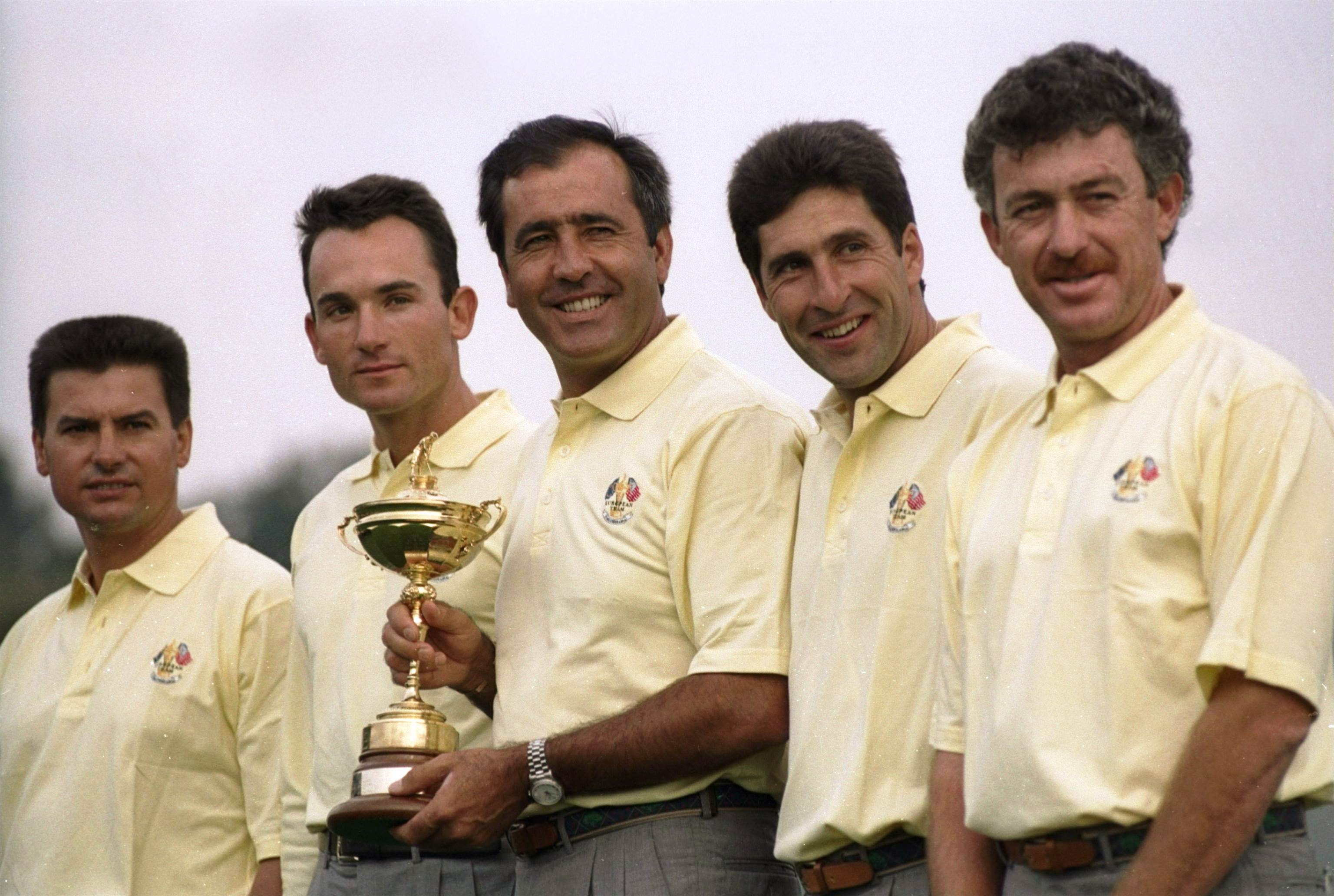It’s only been “Europe” since 1979, of course. Before that, hapless bands of professional stragglers drawn from only Great Britain and Ireland made biennial attempts to take on the might of the United States of America in the Ryder Cup.
So the upcoming encounter at Whistling Straits will be the 21st contested by Old and New Worlds separated by uncommon languages and the not insignificant body of water known as the Atlantic Ocean.
At this point I must admit that what follows is the result of spare time on my hands, a restless mind and nothing worth watching on the telly. But stick with me, at least until eye-rolling sets in.
What set me off was my long-standing notion that there has been a rather unsavoury bias towards GB&I and against CofE (continent of Europe) when it comes to the European Ryder Cup captaincy. Here’s the list so far:
1979 John Jacobs (English)
1981 John Jacobs (still English)
1983 Tony Jacklin (also English)
1985 Tony Jacklin (see 1983)
1987 Tony Jacklin (see ’83 or ’85)
1989 Tony Jacklin (you know the drill)
1991 Bernard Gallacher (Scottish)
1993 Bernard Gallacher (still Scottish)
1995 Bernard Gallacher (see above)
1997 Seve Ballesteros (Spanish)
1999 Mark James (English)
2002 Sam Torrance (Scottish)
2004 Bernhard Langer (German)
2006 Ian Woosnam (Welsh)
2008 Nick Faldo (English – but outer space, at least that week)
2010 Colin Montgomerie (Scottish)
2012 Jose Maria Olazabal (Spanish)
2014 Paul McGinley (Irish)
2016 Darren Clarke (Irish)
2018 Thomas Bjorn (Danish)
2021 Padraig Harrington (Irish)
That’s a score of 17-4 in favour of those who call the British Isles, “home”. Which, given the enormous contributions made by those from the continent over the last 42 years, does seem more than a little bit egregious. Especially if we delve a little deeper.
For example, was Manuel Pinero even considered for the captaincy at the end of his distinguished career? Nope.

The Spaniard played in two Ryder Cups and amassed a 6-3-0 record, but was never quoted as a potential skipper. The same is true of another Spaniard, Jose Maria Canizares. In four Ryder Cups during the 1980s, Canizares emerged with a winning record (5-4-2) and lost only once in singles. More recently, Miguel Angel Jimenez has been passed over, despite playing with some distinction in three Ryder Cups.
Go right up to date and the discrimination continues. By all accounts former European No.1 Robert Karlsson made himself an almost indispensable part of Bjorn’s backroom team in 2018. It was no coincidence that the lanky Swede was amongst the first-named of Harrington’s deputies this time round. But, despite the fact that he has so many of the same qualities that made McGinley so outstanding, is Karlsson ever going to be captain? Not a chance apparently.
And it will be interesting to see if Germany’s Martin Kaymer – you know, the former U.S. Open. U.S. PGA and Players champion who was once World No.1 and just happens to be one of the most thoughtful and intelligent members of golf’s elite – ever gets the nod. Given past history, one has one’s doubts.
By my count (and including this year) 89 men have represented or will represent Europe in the Ryder Cup. As many as 53 hail from GB&I, 36 from countries elsewhere. That means just under 60 percent of the players have been or will be British or Irish; just over 40 percent continentals.
 Yet almost 81 percent of the time the teams have been captained by a Brit or an Irishman. Call me crazy, but a continental captain once in every five Ryder Cups doesn’t seem right, or balanced, or fair.
Yet almost 81 percent of the time the teams have been captained by a Brit or an Irishman. Call me crazy, but a continental captain once in every five Ryder Cups doesn’t seem right, or balanced, or fair.
Because it isn’t.
RIGHT: Swede Robert Karlsson has recieved high praise for his work as a vice captain but looks unlikely to get a chance at the top job. PHOTO: Christian Petersen/Getty Images.
Indeed, before Bjorn popped up to lead the way at Le Golf National three years ago, one can legitimately argue that the only continentals afforded the honour of the captaincy had been the absolute “stick-ons.” I mean, how could Seve, Bernhard and Jose Maria not be captains at some stage towards the ends of their multi-major-winning careers?
Had they not, this whole thing would have been even more embarrassing than the situation we have already.
And, let’s face it, Sir Nick only got the job at Valhalla 13 years ago because it would have been just plain awkward to explain why the six-time major winner – and notorious loner – was not selected to lead the side he represented on 11 occasions.
Okay, time for more numbers, most of which only serve to underline the point that the continent has been getting a deal that is far from well-cooked over the past four decades or so.
Including this year, 52 players have received wild-card picks from the various European captains. Only 19 (or 36.5 percent) of those have allocated to continentals; 32 (63.5 percent) have gone to players from GB&I.
Only once in our 21 Ryder Cups has the European team contained more continentals than Brits/Irish. Parity – that is a 6-6 draw – has been achieved on three occasions (1999, 2002 and 2018), but only in 1997 at Valderrama have the “foreigners” have outnumbered the “home” players.
"Sometimes – make that oftentimes – “European” doesn’t really mean what it should." - John Huggan.
Perhaps not coincidentally, Seve was the non-playing captain that year in his home country. And this year we have returned to what might be termed “the norm.” Only four of the 12 men who will make their various ways to Whistling Straits – Viktor Hovland, Bernd Wiesberger, Sergio Garcia and Jon Rahm – are from the continent.
Upon closer inspection of the 89 European Ryder Cuppers, we find that England (who provide half of this year’s team) are by far the biggest contributors. As many as 28 “Sassenachs” have played for Europe. Ireland are next on 12. Then Spain on 11, with Scotland and Sweden on 10 the only other nations in double-figures.
For the record, the others are as follows: Denmark 3, Italy 3, France 3, Wales 3, Belgium 2, Germany 2, Austria 1 and Norway 1. That’s 13 nations in all, in case you’ve lost count.
Some other titbits: Not once since 1979 has the European team not contained at least one Spaniard – a remarkable record matched only by (not surprisingly) England. Sweden also have a proud record of representation. Ever since Joakim Haeggman became the first Swede to play in 1993, only in 2004 and again this year has the side not contained at least one of his compatriots. And if we expand that category to include those from other Scandinavian countries (i.e. Denmark and Norway), only 2004 survives as a blip on the almost 30-year old horizon.
Yet still we wait for a Swedish skipper, although Henrik Stenson must be a good bet for some time in the late 2020s.
In conclusion, while at least some – if not most – of this catalogue of discrimination can easily be put down to thoughtlessness rather than any racist tendencies within those making the decisions on captaincy, it remains something that needs to be fixed before it becomes even more pronounced.
My hopes are not high, however, at least in the short-term. Lee Westwood is a strong ante-post favourite to succeed Harrington in Italy two years from now. And Ian Poulter is likely to get the nod at Bethpage (good luck with that one, Poults) in 2025.
Sometimes – make that oftentimes – “European” doesn’t really mean what it should.
Related Articles

Huggan: Is McIlroy the best European golfer of all time?

Ballesteros statue found chopped in pieces in Spain













